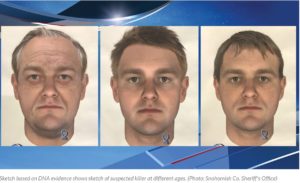Tag: Cops release suspect sketch in unsolved 1987 murder of young couple
Cops release suspect sketch in unsolved 1987 murder of young couple

Tanya Van Cuylenborg, 18 (L) Jay Cook, 20 (R) 1987 photo
EVERETT, Wash. – Investigators are hoping new sketches based on the latest DNA technology will provide a breakthrough in the unsolved 1987 murders of a young Canadian couple in Washington state.
Tanya Van Cuylenborg, 18, and Jay Cook, 20, were found dead in two separate locations in Western Washington after they failed to return home from a visit to the Seattle area more than 30 years ago. Several promising leads in the case over the years have failed to pan out, and the young couple’s killer has never been caught.
But now investigators with the Snohomish County Sheriff’s Office are hoping a series of three portraits of the suspect created with snapshot DNA phenotyping will provide a long-sought break in the case.

Sketch based on DNA evidence evidence shows sketch of suspected killer at different ages. (Photo Snochmish County sheriffs office )
In a Wednesday news conference, sheriff’s officials said they hope the portraits, which show the suspect at three different ages – 25, 45 and 65 – will help solve the murder. They said the suspect’s hair could have been longer and he may have been slimmer or chubbier than shown.
According to police, Van Cuylenborg and Cook left their Victoria, B.C., homes on Nov. 18, 1987, for an overnight trip to Seattle. They were driving a brown 1977 Ford van, and took the ferry across the Strait of Juan de Fuca to Port Angeles.
The purpose of the trip was to buy furnace parts for Cooks’ family business. The couple planned to sleep in the van in Seattle’s SoDo district overnight, purchase the furnace parts the next morning and then travel back to Canada.
After arriving in Washington state, Van Cuylenborg and Cook drove the van to Bremerton and took the ferry to Seattle. They were never seen alive again after that.
When the couple failed to return home, their families filed a missing persons report two days later.
On Nov. 24, a man walking on an isolated road in Skagit County discovered Van Cuylenborg’s half-naked body in a roadside ditch along Carsons Creek Road between Old Highway 99 and Prairie Road. She had been sexually assaulted, bound with plastic ties and shot in the back of the head with a .380 caliber bullet.
On Nov. 25, Van Cuylenborg’s wallet and keys, along with a pair of surgical gloves and a half-empty box of .380 ammunition, were found discarded under the back porch of a tavern in Bellingham.
The locked van was found about a block east of the tavern, next to the Greyhound bus station. Inside the van were plastic ties of the same type used to bind Van Cuylenborg and plastic gloves. A witness said the van had been parked there since Nov. 21.
Cook’s battered body was found on Nov. 26 – Thanksgiving Day – under a tattered blue blanket by the side of the High Bridge on Crescent Lake Road about three-quarters of a mile west of the Washington State Reformatory’s Honor Farm near Monroe in Snohomish County. He had been beaten and strangled, and the same type of plastic ties were found there.
“The person who did this camed prepared to do a brutal crime,” said Snohomish County Cold Case Detective Jim Scharf.
The police were able to obtain the suspect’s DNA from the van, although there has been no match on any criminal database.
Investigators believe that the couple met their killer on one of the ferries, most likely the Bremerton-Seattle ferry, and offered him a ride when reaching Seattle.
In the months after the murders, both victims’ families received a series of taunting greeting cards featuring descriptions of the murders. The cards were postmarked from Seattle, Los Angeles and New York, and were written by the same person.
Scharf said several items belonging to the victims have never been found, including a green canvas backpack and a black jacket belonging to Cook and a Minolta Model x700 35-mm camera with serial number 2067048 belonging to Van Cuylenborg.
Over the years, police have had some promising leads in the case.
– In 1990, a lens from Van Cuylenborg’s missing camera was found in a Portland, Ore., pawn shop, but it could not be linked to a suspect.
– In 2000, police suspected Spokane serial killer Robert Yates might be behind their deaths. But he was later cleared.
– In 2010, it was announced that the writer of the greeting cards may have been found, but later confirmed that he was not the killer and had no connection to the crime.
Scharf said investigators have never given up hope of solving the case because “we do have DNA evidence that will identify the killer.”
“We believe someone out there knows something that will helkp us solve this horrible crime,” he said, adding that the smallest detail could be important.
A $50,000 reward has been offered for information that would solve the case, if provided by Dec. 31. A tip line has been set up at 425-388-3845.
READ MORE—–> KOMO 4 NEWS SEATTLE WA FB Page @KOMONEWS


